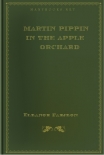Martin Pippin in the Apple Orchard by Eleanor Farjeon (top 10 novels to read .TXT) 📗

- Author: Eleanor Farjeon
Book online «Martin Pippin in the Apple Orchard by Eleanor Farjeon (top 10 novels to read .TXT) 📗». Author Eleanor Farjeon
The Shepherd looked at this strange pair and said surlily, "What want ye?"
"Shelter," replied the crone.
She pushed the lady, who never spoke, into the shed, and took from her shoulders the wet mantle, and from her hands the lantern and the tree; and led her to the Shepherd's bed and laid her down. Then she spread the mantle over the Shepherd's bench and,
"Lie there," said she, "till love warms ye."
Next she hung the lantern up on a nail in the wall, and,
"Swing there," said she, "till love lights ye."
Last she took the Shepherd's trowel and went outside the shed, and set the cherry-slip beside the door. And she said:
"Grow there, till love blossoms ye."
After this she came inside and sat down at the bedhead.
Gerard the Shepherd, who had watched her proceedings without word or gesture, said to himself, "They've come through the floods."
He looked across at the women and raised his voice to ask, "Did ye come through the floods?"
The lady moaned a little, and the crone said, "Let her be and go to sleep. What does it matter where we came from by night? By daybreak we shall both of us be gone no matter whither."
The Shepherd said no more, for though he was both curious and ill-tempered he had not the courage to disturb the lady, knowing by the richness of her attire that she was of the quality; and the iron of serfdom was driven deep into his soul. So he went to sleep on his stool, as he had been bidden. But in the middle of the night he was awakened by a gusty wind and the banging of his door; and he started up rubbing his knuckles in his eyes, saying, "I've been dreaming of strange women, but was it a dream or no?" He peered about the shed, and the crone had vanished utterly, but the lady still lay on his bed. And when he went over to look at her, she was dead. But beside her lay a newborn child that opened its eyes and wailed at him.
Then the Shepherd ran to his open door and stared into the blowing night, but there were no more signs of the crone without than there were within. So he fastened the latch and came back to the bedside, and examined the child.--
(But at this point Martin Pippin interrupted himself, and seizing the rope of the swing set it rocking violently.
Joyce: I shall fall! I shall fall!
Martin: Then you will be no worse off than I, who have fallen already. For I see you do not like my story.
Joyce: What makes you say so?
Martin: Till now you listened with all your ears, but a moment ago you turned away your head a moment too late to hide the disappointment in your eyes.
Joyce: It is true I am disappointed. Because the beautiful lady is dead, and how can a love-story be, if half the lovers are dead?
Martin: Dear Mistress Joyce, what has love to do with death? Love and death are strangers and speak in different tongues. Women may die and men may die, but lovers are ignorant of mortality.
Joyce (pouting): That may be, singer. But lovers are also a man and a woman, and the woman is dead, and the love-tale ended before we have even heard it. You should not have let the woman die. What sort of love-tale is this, now the woman is dead?
Martin: Are not more nests than one built in a spring-time?--Give me, I pray you, two hairs of your head.
She plucked two and gave them to him, turning her pouting to laughing. One of them Martin coiled and held before his lips, and blew on it.
"There it flies," said he, and gave her back the second hair. "Hold fast by this and keep it from its fellow with all your might, for to part true mates baffles the forces of the universe. And when you give me this second hair again I swear I will send it where it will find its fellow. But I will never ask for it until, my story ended, you say to me, I am content.'")
Examining the child (repeated Martin) the Shepherd discovered it to be a lusty boy-child, and this rejoiced him, so that while the baby wept he laughed aloud.
"It is better to weep for something than for nothing," said he, "and to laugh for something likewise. Tears are for serfs and laughter is for freedmen." For he had conceived the plan of selling the child to his master, the Lord of Combe Ivy, and buying his freedom with the purchase money. So in the morning he carried the body of the lady into the heart of the copse, and there he dug a grave and laid her in it in her white gown. And afterwards he went up hill and down dale to his master, and said he had a man for sale. The Lord of Combe Ivy, who was a jovial lord and a bachelor, laughed at the tale he had to tell; but being always of the humor for a jest he paid the





Comments (0)